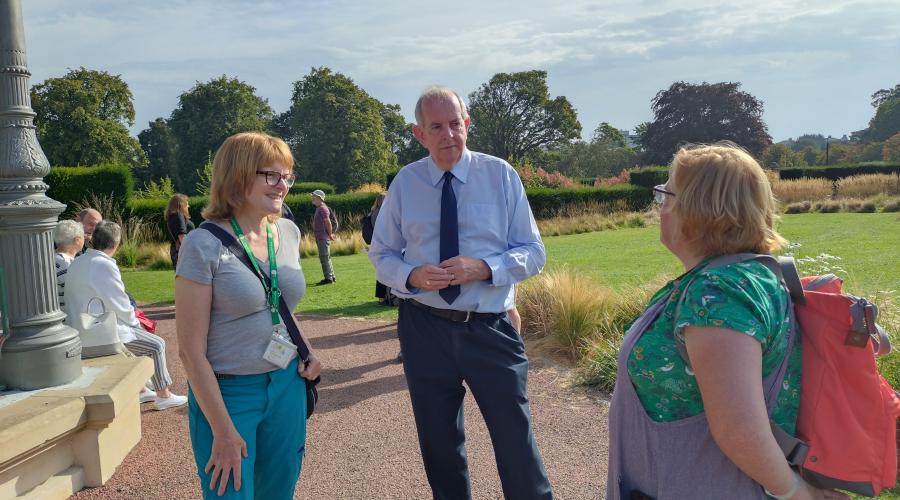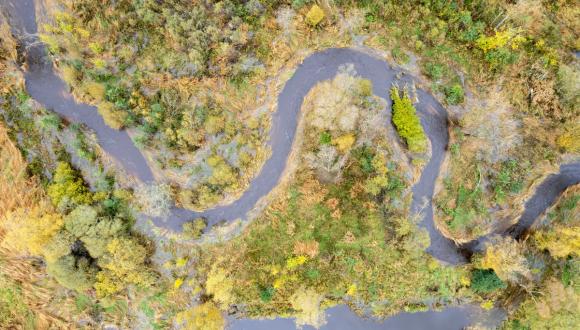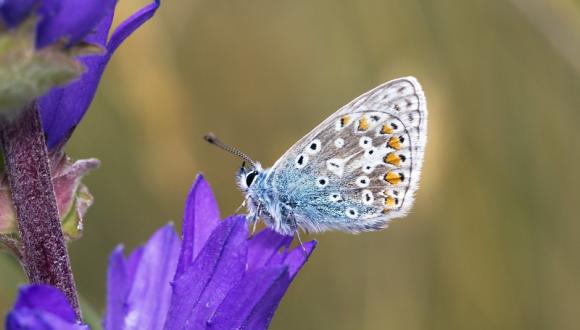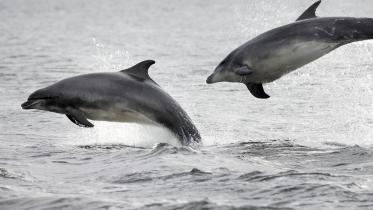
New legal targets proposed for nature recovery
Image caption: NatureScot Chair Colin Galbraith talks with the Friends of Saughton Park at the launch of the Scottish Biodiversity Strategy delivery plan consultation in Edinburgh.
07 September 2023
Scottish Government news release
Further action to tackle the biodiversity crisis
Targets for nature recovery could be put into law in line with those for climate change, as part of a range of proposals to protect and restore Scotland’s natural environment.
The Scottish Government is asking for views on its plans and actions to accelerate nature restoration and regeneration. The consultation sets out the key elements of Scotland’s overall Biodiversity Framework, including:
- Scotland’s Biodiversity Strategy – published in draft form in December 2022 – setting out goals of halting biodiversity loss by 2030 and reversing declines by 2045;
- The first 5-year Delivery Plan to implement this strategy;
- A set of principles to guide the delivery of key commitments to conserve 30% of land for nature by 2030 and expand ‘nature networks’ across Scotland;
- Proposals for the upcoming Natural Environment Bill, including the introduction of statutory nature recovery targets which will be binding on government in the same way that climate change targets require Ministers work towards meeting net zero targets; and
- Changes to National Parks legislation to strengthen the leadership role of National Parks in tackling the climate and biodiversity crises.
Biodiversity Minister Lorna Slater said:
“We are at a tipping point for nature – it is in decline across the globe with around 1 million species already facing extinction. In Scotland alone, we have seen a 24% decline in abundance of wildlife since 1990; if we don’t take urgent action, nature in Scotland will continue to decline and important species will be lost forever.
“This week we have published our Programme for Government which recognises that the twin crises of climate change and biodiversity loss are global challenges of unprecedented proportions. Restoring nature will reduce carbon emissions, and tackling the climate crisis is essential if we are to prevent extinctions. We must be both Net Zero and Nature Positive.
“A nature-positive Scotland creates great opportunities that will benefit people and communities throughout the country and particularly in rural areas. We want to work with everyone – with local government, local communities, organisations and environmental experts - to protect our precious natural environment for future generations.”
“We are especially keen to hear the views of the stewards of our land and seas - farmers, gamekeepers and fishers who have the knowledge and skills to drive the transformation that is needed.”
Anne McCall, Director, RSPB Scotland said:
“We welcome the Scottish Government’s ambition to drive forward and scale up action for nature – action which evidence tells us is needed now more than ever. We are at a crossroads, but this consultation gives me hope as it kickstarts a process that is the biggest opportunity for nature in Scotland that I’ve seen in my 25-years working in conservation.
“This is not just a big moment for nature, it’s important for every person in Scotland. Nature underpins our health, wellbeing, the air we breathe, water we drink, food we eat and much of our economy. Restoring nature will deliver many benefits including creating new jobs.
“RSPB Scotland will consider the proposals in detail and will no doubt have suggestions. That is why this consultation is so welcome: delivering the change needed for nature and people will require collaborative action across government, NGOs and the private sector and requires a collective discussion to ensure we get the plans right and then delivered successfully.”
NFU Scotland Director of Policy, Jonnie Hall said:
“As with climate challenges, active farming and crofting are critical to this nation’s biodiversity ambitions. With more than 70 per cent of Scotland’s land under agricultural management, farmers and crofters have a unique role in the stewardship of our habitats and wildlife.
“Rural Scotland is a working landscape, with food production and economic activity being driven by sustainable land management. For nature to flourish, we need to enable those who manage our land to deliver multiple outcomes. Enhancing our natural environment is clearly in the public interest and will deliver an array of public goods. But that cannot be sustained at private cost. We have the clear opportunity to ensure our agricultural landscapes deliver the right outcomes for food production, climate, biodiversity and rural communities and a balanced approach to delivering on all four fronts is critical.
“We will encourage farmers and crofters to participate in this consultation as it offers an opportunity to shine a light on all the great work already being undertaken on farms and crofts as well drilling down on the full range of reasons that lie behind any biodiversity loss.”
NatureScot Chair, Colin Galbraith said:
“Nature is in crisis, and we need to take urgent action now. This consultation is an opportunity for everyone to get involved in tackling the crisis in our natural world. We want to hear from the land managers, farmers and crofters already working to support and enrich wildlife, as well as from people in rural and urban communities who seek a fair and just transition to a nature-rich future for all. Now is the time to speak up for nature; to tell us what your priorities are for the future – we are listening.”
Find out more on Scotland's Biodiversity Strategy and the consultation.
Background
The consultation seeks views on a range of measures aimed to accelerate the pace and scale of efforts to tackle the biodiversity crisis which will expand protected areas, improve condition and connectivity; support nature-friendly farming, fishing and forestry; and recover and protect vulnerable and important species.
This includes the first Biodiversity Delivery Plan which contains a large number of ambitious and wide-reaching actions; plus draft frameworks which set out the Vision and Principles that will underpin delivery of the commitment to protect 30% of Scotland’s land for nature by 2030, and to create nature networks across Scotland. These have been developed by working with over 100 different organisations, to ensure the views of those involved in delivering these commitments are at the heart of these proposals.
The consultation also includes proposals to develop a framework for statutory nature targets and sets out proposed changes to national parks legislation to strengthen the leadership role of National Parks in tackling the climate and biodiversity crises whilst continuing to focus on welcoming visitors and supporting local communities and businesses.
The consultation will be supported by a series of thematic workshops to ensure people from across different interest groups have the opportunity to ask questions, provide their ideas and help develop the framework to deliver a nature-positive, net zero Scotland.
Saughton Park
Saughton Park is described by the City Council as “one of Edinburgh's hidden jewels.” This 34 acre park underwent an extensive restoration project from 2014 to 2018 with funding from The National Lottery Heritage Fund, Scottish Government, Sustrans and other sources. Large areas of the park were redesigned and are now maintained with nature in mind. The Royal Caledonian Horticultural Society, a very active Friends group and other community volunteers have created biodiverse-friendly sites including a wildflower meadow, orchard area, pond and community garden.
Edinburgh Nature Network
Since 2019, the City of Edinburgh Council together with the Scottish Wildlife Trust have undertaken pioneering work to develop the Edinburgh Nature Network. Saughton Park is an important node in the Edinburgh Nature Network, sitting on the Water of Leith greenspace corridor and offering opportunities to enhance biodiversity through connecting nearby greenspaces either directly, or through a ‘stepping stone’ approach.
Edinburgh Nature Network is the first Nature Network to be developed in Scotland. It is a long-term strategic approach to manage, restore and enhance the urban landscape of Edinburgh. It highlights opportunities to take action across the city, using natural solutions to address the threats of biodiversity loss and climate change. Its development was led by the City of Edinburgh Council and Scottish Wildlife Trust as part of the Thriving Green Spaces project.





